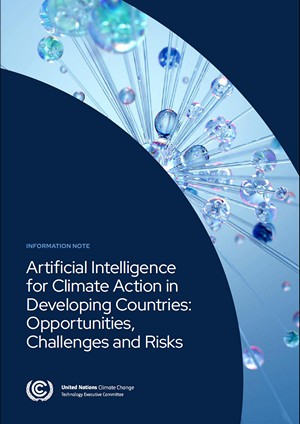AI for Climate action: advancing mitigation and adaptation in developing countries
This technical paper has been prepared by the Technology Executive Committee (TEC) as part of the TEC rolling workplan 2023-2027. It offers a comprehensive overview for policymakers, practitioners, and researchers navigating opportunities, challenges and risks of the use of AI for climate action in developing countries, with a focus on least developed countries (LDCs) and small island developing States (SIDS).

Click here to download
| The technical paper: - Presents the potential of AI in supporting climate change mitigation and adaptation in developing countries, particularly LDCs and SIDS. Potential AI applications include optimizing energy systems, enhancing early warning mechanisms, improving infrastructure planning, and supporting resource and ecosystem management.
- Introduces barriers and risks to using AI for climate action. The deployment of AI in developing countries face challenges such as inadequate digital infrastructure, limited technical capacity, insufficient access to high-quality climate data, and risks such as concerns regarding algorithmic bias, cybersecurity, and the environmental footprint of AI systems.
- Provides recommendations such as targeted investments in digital infrastructure and human capacity development, the establishment of inclusive and transparent governance frameworks, the promotion of open-data initiatives, the development of energy-efficient AI systems, and the strengthening of international collaboration to address regulatory and technical gaps.
|
Acknowledgement: The Technology Executive Committee extends its appreciation to the United Nations Industrial Development Organization and the Ministry of Economy, Trade and Industry of Japan for the generous support provided for the preparation of this technical paper.
AI for Climate Action in Developing Countries: Opportunities, Challenges and Risks
This information note has been prepared by the Technology Executive Committee (TEC) as part of the TEC rolling workplan 2023-2027. It provides an overview of the opportunities, risks and challenges of using artificial intelligence (AI) for climate action in developing countries, with a focus on LDCs and SIDS.

Click here to download
| The information note: - Explores the role of AI in addressing climate challenges in developing countries, particularly in the LDCs and SIDS. It emphasizes the potential of AI to enhance adaptation efforts through AI application, including climate modelling and planning, early warning systems, optimizing agri-food systems, and mitigation efforts through AI applications such as greenhouse gas (GHG) monitoring, energy and transport management.
- Introduces the challenges and risks associated with the usage of AI including the digital divide, data availability and access, data security, gender bias and social inequities, energy and water consumption, and AI applications that increase risks from climate change.
|
Acknowledgement: The Technology Executive Committee extends its appreciation to the United Nations Industrial Development Organization and the Ministry of Economy, Trade and Industry of Japan for the generous support provided for the preparation of this information note.


